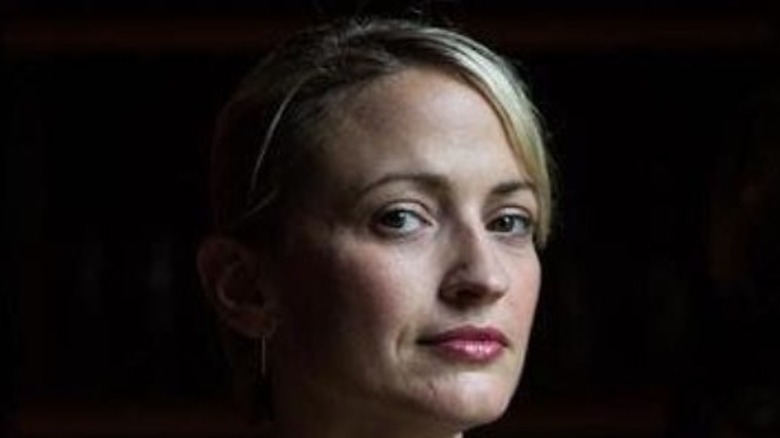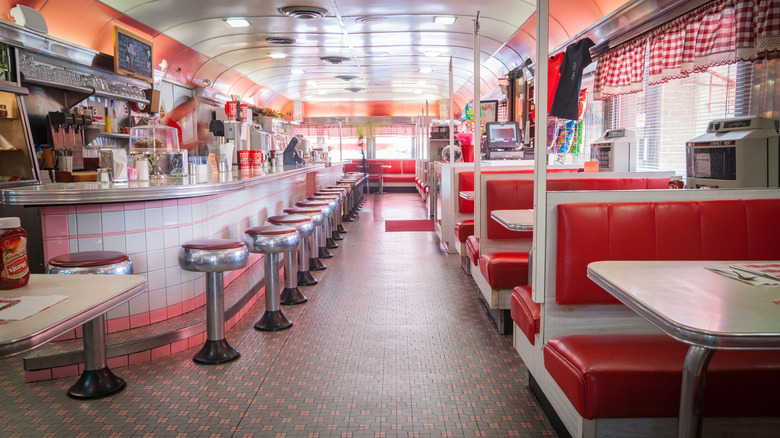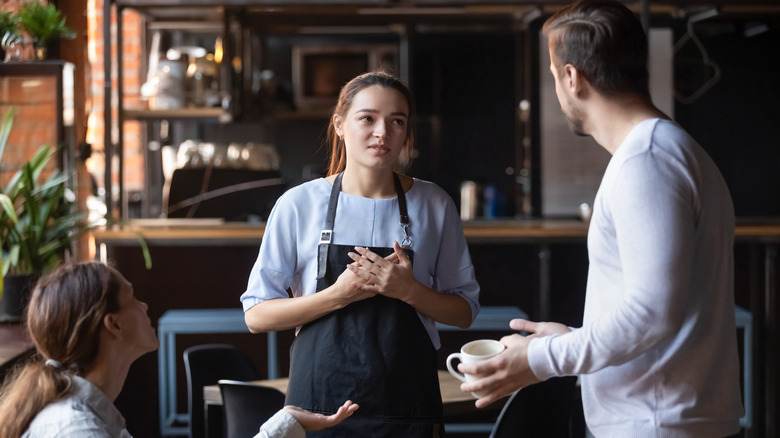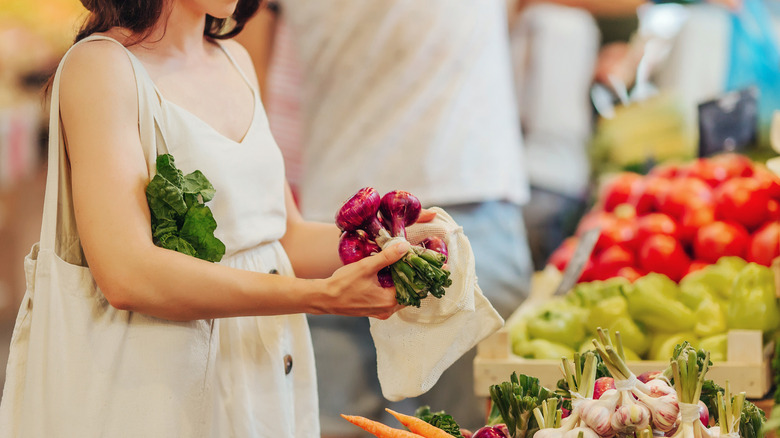The Untold Truth Of Erin French
We may receive a commission on purchases made from links.
Back in 2018, Chip and Joanna Gaines announced plans to produce a new TV channel called the Magnolia Network (via House Beautiful). While home viewers can't enjoy the full channel until January 2022, some of the content has already dropped on other platforms, including Erin French's "The Lost Kitchen" (via Amazon Prime Video). The series focuses on French, her life, and how she handled surviving the pandemic as a successful chef who had to shutter her restaurant for extended stretches of time. Through the course of the series, French helps set up an online farmers market to support her restaurant, negotiates offering a brand-new lunch service, and ruminates on how to keep bringing joy to diners while dealing with the new reality of dining during a pandemic.
You couldn't ask for a better subject than French. According to the New York Times, French's restaurant, The Lost Kitchen, is situated in a corner of Maine in a former mill. You couldn't ask for a more intimate experience, as the restaurant seats a limited capacity of diners, relies on local ingredients, and thanks to Prohibition-era laws, requires patrons to purchase their wine from a shop underneath the restaurant. The Lost Kitchen was a labor of love and helped propel French to new heights in the restaurant industry. The world can learn even more about French through "The Lost Kitchen," but the untold facets of her life make her story even more unique.
French started cooking thanks to her parents
Growing up, French spent her days after school in her family's diner (via People). The close proximity to food and the warm feelings surrounding it had a major impact on the chef. "My whole childhood is filled with memories there," French said. "I remember the nutmeg-laced donuts, so warm and crunchy — I can still taste it. Food ran through our entire family. We were surrounded by it." As she grew up, she took on greater roles at the restaurant, including washing dishes and cooking breakfasts.
After getting pregnant and dropping out of university at the age of 21, her mother stepped in and gave French the support she and her newborn son needed. With this support, French pivoted her career and started an underground supper club that relied on using as many local ingredients as possible. French continued working on her cooking skills and eventually built her supper club into a successful restaurant. The love and support French's family fostered helped inspire her successful career as a chef and laid the foundation for a culinary journey that would take French to new heights.
French considers herself a host, rather than a chef
Many top chefs take pleasure working in a kitchen and coming up with creative uses for ingredients. While French loves transforming local ingredients into exquisite creations, she sees her role as that of a host, rather than a chef. "I love caring for people," French told People. "It's the setting of the table. It's getting the lights just right. It's the music. Watching everyone have that experience is my greatest joy." If you walked into The Lost Kitchen prior to the pandemic, you could instantly feel French's warmth greet you at the table.
According to the New York Times, French has a tendency to walk right out into the middle of the dining room, actively engage with customers, and even give toasts to the room. French's immediate friendliness bestows a special kind of intimacy you may not find at another high-caliber restaurant, and at times, resembles dining at a loved one's home. This same style of hospitality extends to the restaurant's workflow — French actively strives to break from stereotypes about the high-pressure attitudes found in kitchens, and tries to develop a welcoming environment for staff and diners alike.
French overcame addiction before opening The Lost Kitchen
In the years before opening The Lost Kitchen, French had to address her addiction to prescription medication and alcohol. According to People, French received Xanax and Ambien prescriptions from doctors to help reduce the effects of depression and anxiety. Over time, she started to misuse the medication. "I was hoarding them, trying to get multiple prescriptions from one doctor or another because it was the only thing that made me feel okay," French said. "I wanted to drown it all out."
French sought help in 2013 and checked herself into a rehabilitation facility. During this period, she learned that her husband at the time had secretly closed her first restaurant. After completing her treatment program, French had to fight through a lengthy divorce process, including maintaining custody of her child, and eventually restarted by opening up a second run of supper clubs out of a vintage airstream trailer. While this period felt like it would never end, French emerged healthier and ready for her next restaurant. She eventually documented this time in her life in a memoir, "Finding Freedom: A Cook's Story; Remaking a Life from Scratch," which she wrote to process her own experiences and inspire others who might currently face a similar predicament (via Today).
If you or anyone you know is struggling with addiction issues, help is available. Visit the Substance Abuse and Mental Health Services Administration website or contact SAMHSA's National Helpline at 1-800-662-HELP (4357).
The Lost Kitchen relies on a female-powered staff
When French decided to open up The Lost Kitchen, she called on local female farmers from her area to help source the produce that ends up on the menu (via Food and Wine). Those same farmers went on to join the restaurant's team of employees, which is almost completely female. French, who calls each staff member a close friend, credits these friendships for the high quality experience diners have when they eat at The Lost Kitchen. "I get the best produce," French said. "My friend will text me a photo of a cauliflower in her field, and I'll say, 'Bring me 12 of those.'"
These same relationships have resulted in French scoring ducks, salad greens, and many other local ingredients to form a menu that draws on the flavors of Maine. This warm, friendly ambiance and focus on local fare has come to define the restaurant.
French emphasizes no-frills intimacy above everything else
French's restaurant relies on its local, friendly charm to make diners feel at home in the close-knit dining space. According to Food and Wine, her unique take on haute cuisine starts in the kitchen. French never attended a culinary school or received formal training, relying on methods taught to her by her mother and grandmother, in addition to studying stacks of cookbooks. As a result, French creates dishes using as few ingredients as possible, relying on the flavor of incredibly fresh produce and meat to drive home the dining experience. Her straightforward approach eschews the intricate techniques of fine dining in lieu of a comforting meal that feels like home.
When the pandemic hit, French had to close up shop, but that didn't stop her. She tapped into the same concept of creating a local, intimate experience and expanded her restaurant to include an online farmer's market where patrons can enjoy the same ingredients the restaurant typically uses (via Southern Living). With restrictions easing, French now plans to take cozy to whole new levels by constructing cabins around her restaurant so patrons who travel massive distances to eat at The Lost Kitchen (which only takes reservations by postcard) can spend the night. This approach to dining and hospitality truly sets Erin French apart from her contemporaries and makes her a personality you need to keep your eyes on.





